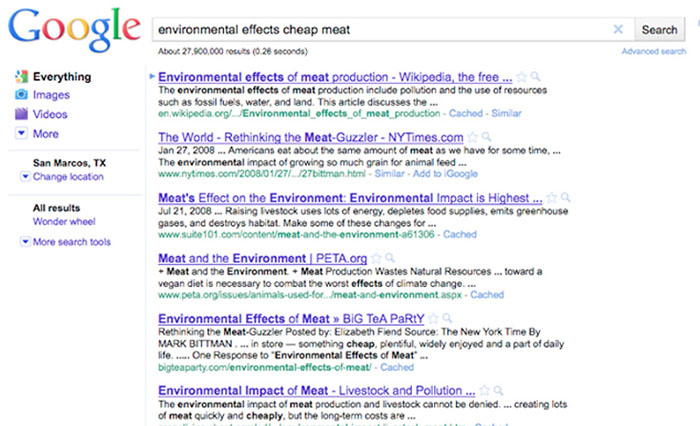Refining Your Research Question Through Searching
Having the right research question is critical to writing a good research paper. In the prewriting I did for section three, I mentioned a newspaper headline that said that being a vegetarian was better for the environment than eating meat. What if, instead of doing all of this work, I just went with the question “Is being a vegetarian better for the environment than eating meat”? Is this a good research question? The problem with this question is that there are too many variables. First, are we talking about vegans (people who don’t eat any animal products including milk, cheese, and eggs), lacto-ovo vegetarians (people who don’t eat meat but eat milk and eggs), or people who drink milk and eat only vegetables? As we learned from the Food, Inc. trailer, there are also different issues with producing different types of animal products. Some seem to be worse for the environment than others. So, although this is a researchable question, it’s too broad for us to come to any meaningful conclusions.
What if I went in the other direction and asked, “Is being vegan better for the environment than eating meat”?
Without doing any preliminary research, I can bet that the answer to this question is “yes.” So, doesn’t that make it a good research question? No, it doesn’t, because your sources would probably say the same thing, and that doesn’t make for an interesting paper. If a question is answerable without much effort, there is no reason to spend lots of time pursuing what you already know. The best research questions aren’t ones that have an immediate "yes" or "no" answer, but those with the answer “I don’t know.” So, when you are crafting a research question, you need to keep looking for that question that you can’t answer right away.
In the previous section, I wrote a draft of my research question, “Considering the cost of raising and processing cattle, why do two hamburgers cost less than one pound of broccoli?” But this question doesn’t fit my purpose. We need to refine the question to make it fit the purpose of writing about protecting the environment.
Having the right question is critical to having a well-written research paper.
We can refine our research question by doing a preliminary search on the Internet. A Google search could help find information to refine the question. First, I have to decide what search terms to use. On my mind map, I had a category called “Environmental effects of meat.” I had “lots of cows,” “cow waste,” “where to put cows,” and “lots of feed for cows” as entries. Usually, the more a manufacturer makes of something, the cheaper it is to produce, so I think cheap meat is going to require many, many cows. If there are lots of cows, there will need to be a great deal of food to feed them, and those cows are going to produce a great deal of waste. Additionally, most cows are fed grain, and growing grain can affect the environment, too. So, I am going to type the search string “environmental effects cheap meat.” Here are the results:

Source: Google Search, Google.com
This search came up with over 27,000,000 results! The second result is the article “Rethinking the Meat-Guzzler” from the New York Times. I know that this newspaper is a valid source (evaluating sources is covered in another lesson), so I am going to read that article. You can link to the article here if you want to read it in its entirety, but for our purposes you can read the excerpt below.
Growing meat (it’s hard to use the word “raising” when applied to animals in factory farms) uses so many resources that it’s a challenge to enumerate them all. But consider: an estimated 30 percent of the earth’s ice-free land is directly or indirectly involved in livestock production, according to the United Nation’s Food and Agriculture Organization, which also estimates that livestock production generates nearly a fifth of the world’s greenhouse gases—more than transportation.
To put the energy-using demand of meat production into easy-to-understand terms, Gidon Eshel, a geophysicist at the Bard Center, and Pamela A. Martin, an assistant professor of geophysics at the University of Chicago, calculated that if Americans were to reduce meat consumption by just 20 percent it would be as if we all switched from a standard sedan—a Camry, say—to the ultra-efficient Prius. Similarly, a study last year by the National Institute of Livestock and Grassland Science in Japan estimated that 2.2 pounds of beef is responsible for the equivalent amount of carbon dioxide emitted by the average European car every 155 miles, and burns enough energy to light a 100-watt bulb for nearly 20 days. Grain, meat and even energy are roped together in a way that could have dire results. More meat means a corresponding increase in demand for feed, especially corn and soy, which some experts say will contribute to higher prices.
The entire article is interesting and a good resource for this topic, but the excerpt above gave me an idea for refining our research question. If, according to the Food, Inc. trailer, meat is cheaper than vegetables, and according to the article above, high meat consumption is bad for the environment, then our research question becomes this:
Is it possible for meat to be environmentally-friendly and affordable?
This research question is interesting and appropriate for the audience (students who will soon be paying their own food bills) and for the purpose (an Earth Day presentation).